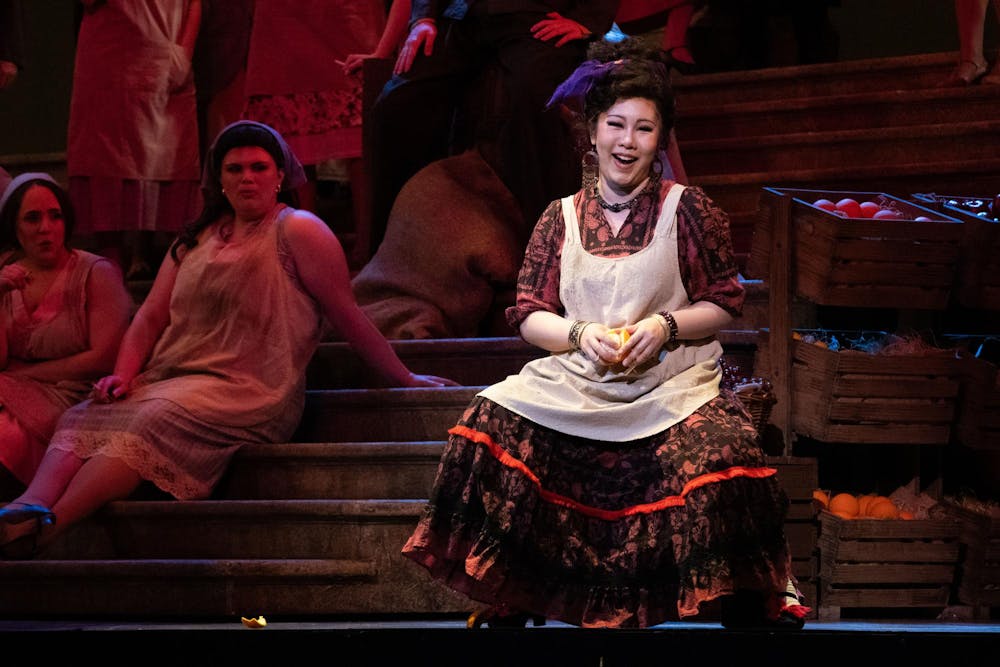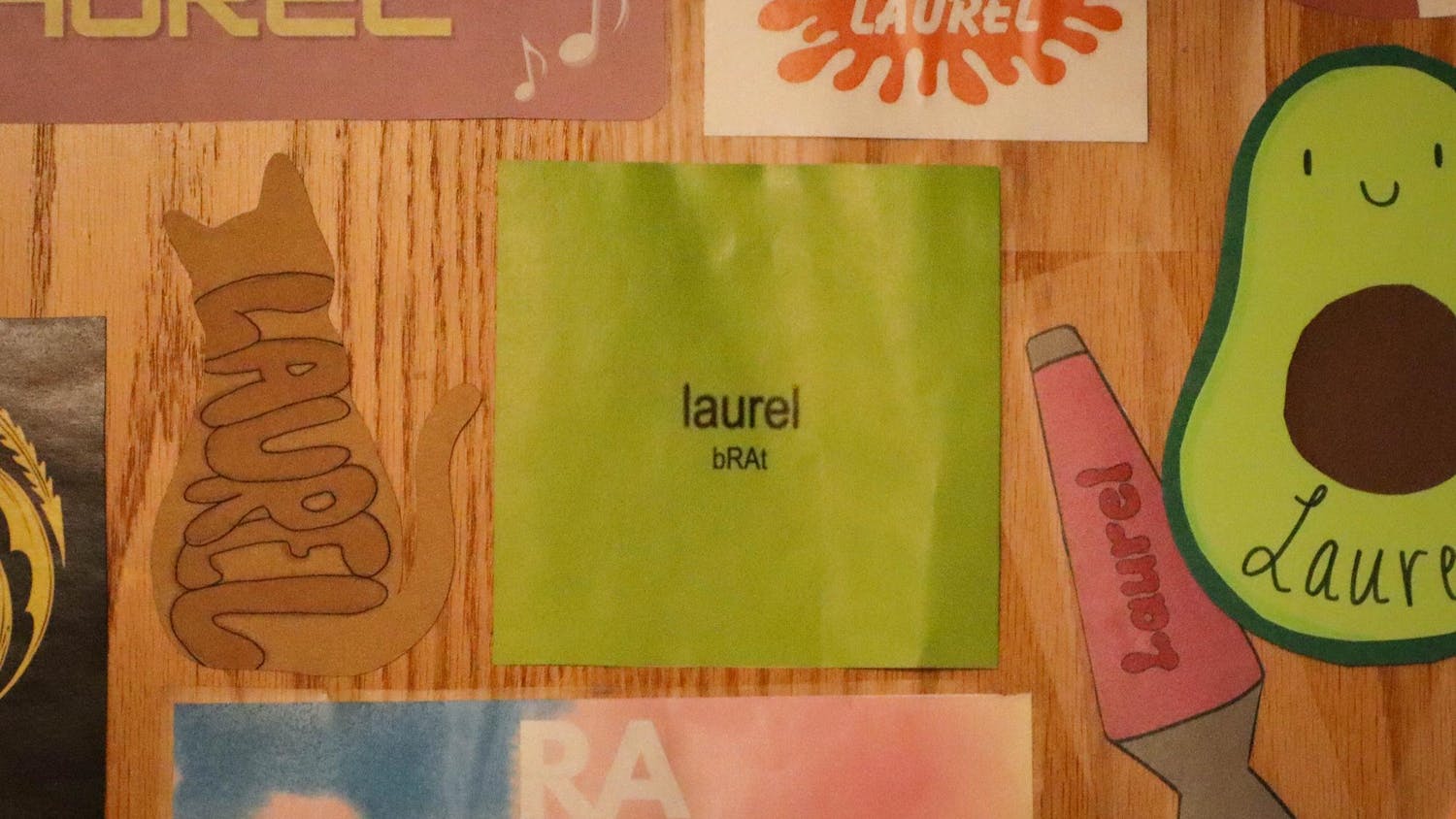Since its debut in 1875, “Carmen” has become one of the most staged operas in the world. The Jacobs School of Music chose the show for its final opera of the 2024-25 season.
The opera follows Don José, a Spanish soldier, who falls obsessively in love with Carmen, a Roma woman. Their relationship and its downfall are shown over the opera’s four acts.
The Indiana Daily Student spoke with director Keturah Stickann before the show’s last weekend of performances. Tickets for performances at 7:30 p.m. April 25 and 26 can be purchased on the Jacobs website.
IDS: Starting off, what is important to know about “Carmen”?
Stickann: “Carmen” is a piece that was written in the mid 1800s, but I think (is) still relevant today. It's about an abusive relationship, which we still experience today. But essentially, the piece is about obsession and lust and abuse. I think, at the time, the Romani people were seen as exotic and as swindlers, as liars, as people that could draw, quote, “innocent people down the wrong path.” And so, for a long time, Don José, in his obsession with her (Carmen), was seen as the victim, as someone who was drawn into her way of life and then suddenly driven crazy by it. I think today when we look at this, we see a woman who is being othered by her community and is pretty honest about how she feels about relationships. And this man becomes so obsessed with her, that he can't let her be with anybody else, and so he ends up killing her. All of the signs of an abusive man are there. I mean, it's written very well as an abusive relationship. It's just our perception of how men and women should relate to each other has changed.
IDS: “Carmen” was controversial in its characters when it was first released. Why was that?
Stickann: The thing about “Carmen” is…it paved the way for verismo. I mean, it was the first time that people who were not royalty and kings and more upstanding individuals were seen on stage. And so, there were a lot of people in the audience when it first premiered that thought that this was not an acceptable story to be told on stage. What we expect to see now has certainly changed, but at the time, yeah, it was shocking.
IDS: Audiences don’t quite have that same perspective in the modern day. How do you explain to your performers the context of what this opera meant at that time?
Stickann: We just talk about it. A big part of our conversation has been about the malignment of the Romani people and how, at the time, they would have been considered people that no one should associate with. We've grown to learn that they are a community that is very proud and worthy of autonomy, so we talk about how there are communities even here in the United States that get othered on the regular basis. And this is what we're portraying. We've also updated the piece. The piece is updated to the 1920s when Spain was under its first dictatorship of Primo de Rivera. The reason I do that is because I think it gives the Romani people purpose inside of the show. They would have been working for the resistance and absolutely been running guns for the resistance. It gives their smuggling business a reason, and one of the big things that we talk about is that during that dictatorship, but also earlier, part of the reason that the Romani people end up smuggling and thieving and all of the things that we hear, the bad things about what the Romani people have done, is because they were not considered citizens. They were not allowed to work. It would have been very unusual. Actually, the fact that Carmen works in a factory is a very unusual thing and so they had to make money somehow. This is why they have gotten into more underhanded spaces. So we talk about all of this, and one of the big conversations we've had with José, because it's very hard, I mean, we had two of the nicest guys — Jinpark Choi and Josh Hooker — both just stand up lovely, sweet men playing José, and José is a killer. José is a man who has no control over his temperament, and he has major anger issues. We see that very early on in the show. And it was hard for both of these gentlemen to find their way into this character because it's not them. And we had to talk about how José doesn't see himself as a bad man, he sees himself as somebody who's a survivor, and so we had to talk about how a man could harbor so much anger and how it could come out in such a way. It's hard to find those characters when you yourself are not one of them.
IDS: You just mentioned, the characters in this are different, maybe more challenging emotionally than a lot of the other characters that these students typically play. What does the experience of playing a character like those in “Carmen” offer to the students?
Stickann: This is a major acting lesson. Complex characters exist. I wouldn't actually say that they're more complex than others that they play, but certainly the way that we're presenting them is more complex. I think it's important to play all walks of characters and to really be able to dive into somebody that isn't you. It's a supreme acting lesson and something that really allows young singers to fully stretch their acting abilities and their ability to tell a story on stage.
IDS: “Carmen” is probably one of the more well-known operas. What do you think has made it so popular and timeless?
Stickann: I think people like a dark story for sure, but really, it's the music. I mean, the music is just fantastic. And I think that it's danceable, it's singable. People walk out of the theater humming it. And I think that the music tells the story so beautifully and was written so perfectly to align with what the characters are doing, saying and thinking that it just, it presents a fantastic night in the theater and so has endured.
IDS: What would you say your personal favorite part of the show is?
Stickann: I have a lot of personal favorite parts of the show. The one that always sticks out to me though is, I mean, maybe it's the opening of Act Two, it's called the “Les tringles des sistres tintaient” which means, originally, “Gypsy Song,” but that's a word that we don't particularly like to put up with that group of people anymore. It's a song that Carmen is in the bar, and she just starts singing. There's music playing extensively in the bar and she just starts singing this song that we think probably is a song that they all know. And it's just about the pride and fire and warrior-ness of the Romani people. And the bar starts off slow, and the bar starts to slowly kind of be there with her, and then they all start to sing with her, and then they all start to dance with her. It just gets wilder and wilder and wilder and wilder until the singing ends and it just turns into a massive frenzy of dance. And I love the fact that it's both dancers and singers and its chorus and principles and it's a show piece, but it also really puts us into who these people are. And I love the way that it starts off Act Two that finally, you know, we see, in Act One, we see Carmen out of her element. And in Act Two, at the beginning, immediately she's there with the people that she loves. And I just love that moment in the opera.
IDS: There are some parts of opera that are a bit outdated and offensive, like the characterization of the Romani people. What is this production doing to approach that and respect these marginalized groups?
Stickann: Mostly I just try to remember that every character on the stage is deserving of their tale. Carmen is often shown as a sorceress or as a witch, and I kind of abandon that and she certainly, I think, is a woman who believes in fate and believes in (and) has her own spirituality. But I don't think she is a sorceress, nor does she think so. And I try to pull myself away from those stereotypes that get thrown on her and the rest of her population constantly. And I try to give her as a woman more authority, more autonomy, more willing to say what she means. But ultimately, it's about not stereotyping. My costume designer and I did massive research to make sure that what we were showing didn't have any of the what I call “Disney stereotypes” of that population. I feel like it's a group of people who deserve to stand proud. And so, I want to make sure that anything that we show that sits in that space is not maligning them in any way.
IDS: Have you ever worked with “Carmen" before? Is your approach for this one at all different from your previous ones?
Stickann: This is my fifth. I think the first time I worked on “Carmen,” I was an assistant, and you just kind of have to go along with it. But I learned a lot of what I want to do and what I don't want to do. Every time you work on a piece, you learn more about it, you learn, you dive more inside of it. I think I've grown more and more into it. I think more and more I'm interested in pulling out Carmen's story and making sure that we see that she's the victim in the story and not José. Small tweaks, you know, it's just more about the way that we talk about it, the more we talk about the characters. Little things that I've done, some of them, things I don't want to give away for people seeing it next weekend. But, you know, I just, I think I just dive further into the idea of really making sure that her story is told and that she gets to stand up on her own two feet. I think the last three times I've done it, I would say I've been pretty much in the same pocket every time. I feel like I've found a way of telling it that I like and think resonates.
IDS: This is the last Jacobs opera of its season. Why do you think “Carmen” was chosen as the final opera?
Stickann: Oh, it's just, it's so huge. It's a huge show. I think there's almost 100 people on stage every night. It's a huge chorus, there's 20 kids in it, a massive group of principals. It's just a big show. And I think that when you're thinking about closing out a season, you want something that has a big splash, that ends with a big shock, that has people really, like, walking away humming the music, and “Carmen” fits all of those niches.




